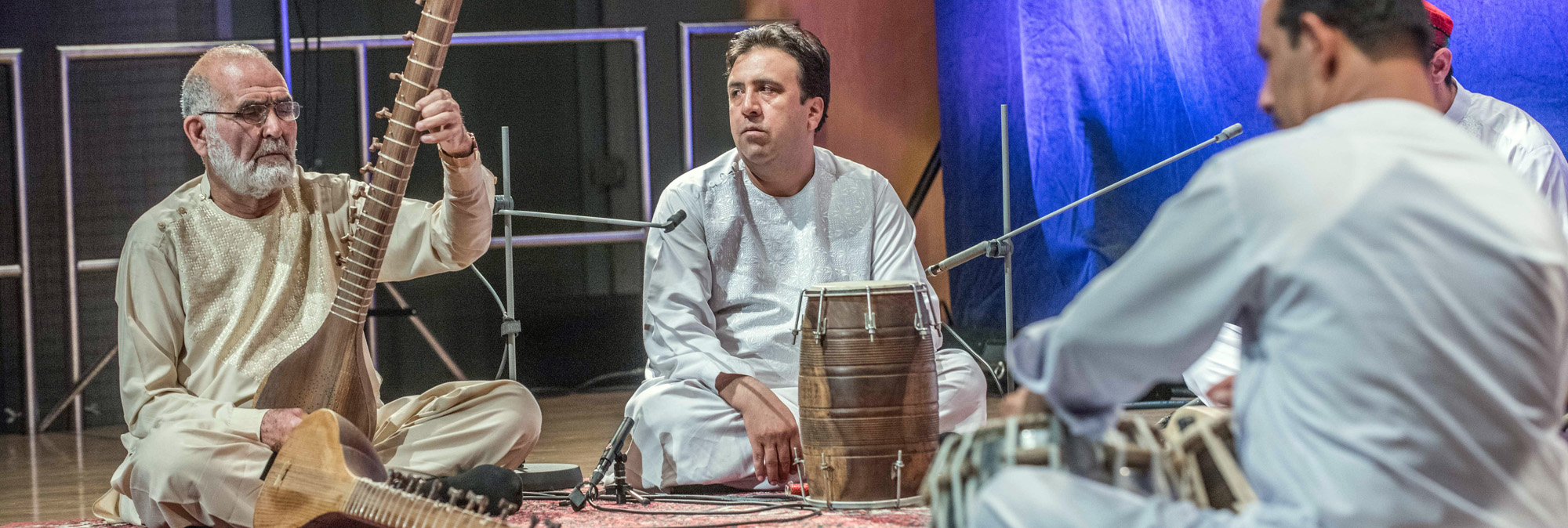Circulating Knowledges | 2020–2023
Knowledge Transfer between Academia and Traditional Music Cultures in Colombia and Brazil
The aim of the project "Circulating Knowledges" is to document intangible cultural heritage as music and performance traditions in Colombia and Brazil in their historical connection to African traditions and their further development, and to communicate and research them in the local contexts. The cooperation uses new formats to transfer traditional music knowledge from the South Pacific and Caribbean regions of Colombia and the Brazilian Recôncavo da Bahia into academic formats and languages. Through the collaborative development of field-based video learning modules, teachers and students engage in a lively exchange with culture bearers and their cultural practice on the ground. This enables a synergetic circulation of different knowledge within and outside academia.
New didactic formats and video archive
The UNESCO Chair on Transcultural Music Studies at the FRANZ LISZT Weimar University of Music is coordinating the four-year project (2020–2023) with the Universidad del Valle of Cali (UdV) in Colombia and the Universidade Federal do Recôncavo da Bahia of Santo Amaro (UFRB) in Brazil. The trilateral project is part of the German Academic Exchange Service (DAAD) programme "Subject-Related Partnerships with Institutions of Higher Education in Developing Countries". The aim is to improve and expand teaching in the partner countries as well as to build structures and develop capacities at the partner universities.
Sustainable study programmes
Numerous symposia, seminars and excursions are planned within the framework of the DAAD project, as well as the establishment and expansion of archives. A four-day international conference will be organised in Weimar for the final evaluation and dissemination of the project results to a wider academic audience from Europe and abroad (2/2023).
Sponsor: German Academic Exchange Service (DAAD)
Partners: Universidad del Valle of Cali (UdV), Faculty of Music, Colombia and
Universidade Federal do Recôncavo da Bahia of Santo Amaro (UFRB), Centre for Culture, Languages and Applied Technologies, Brazil

Afghanistan Music Research Centre | 2014–2023
Das Afghanistan Music Research Centre (AMRC) wurde im Herbst 2014 am Lehrstuhl Transcultural Music Studies (TMS) am Institut für Musikwissenschaft der Hochschule für Musik FRANZ LISZT Weimar und der Friedrich-Schiller-Universität Jena gegründet.
Schwerpunkte der Arbeit sind:
- das deutsch-afghanische Konzertprojekt "Safar"
- universitäre Partnerschaften und collaborative research
- die Arbeit mit musikhistorisch bedeutenden Archiven
- die Erstellung von Lehr- und Lernmaterialien
- kulturwissenschaftliche und musiksoziologische Forschungen
Ziel der Arbeit:
Die traditionelle afghanische Musik entstand über die Jahrhunderte unter dem Einfluss verschiedener Kulturräume. Ziel des AMRC ist es, diese einzigartige Vielfalt zu dokumentieren und durch Konzerte, Vorträge und Lehrmaterial einer breiten Öffentlichkeit in Deutschland und Afghanistan zugänglich zu machen. Dabei kooperiert das AMCR mit Partnerorganisationen im In- und Ausland und wird durch das Auswärtige Amt gefördert.
Forschung
Das AMRC setzt sich im Rahmen einer Kooperation zwischen der Kabul University und der Hochschule für Musik FRANZ LISZT Weimar dafür ein, die musikwissenschaftliche Arbeit in Afghanistan nachhaltig zu stärken.
Musikpädagogik
Didaktisch aufbereites Lehrmaterial zur afghanischen Musikkultur existiert weder in Afghanistan noch in Deutschland. Das AMRC bereitet daher musikethnologische Inhalte für allgemeinbildende Schulen auf.
Archive
Technologische Entwicklungen im Bereich der digitalen Speichersysteme eröffnen neue Möglichkeiten der Archivierung und der wissenschaftlichen Zusammenarbeit.
Seit Oktober 2022 sind die Stipendiaten Mohsen Saifi, Mohammad Naseem Fazel
und Mohammad Sediq Zarifyar als Experten im AMRC tätig.
Applied Musicology – Jewish and Arabic Music | 2020–2021
Caravan Orchestra
A core objective of the research project "Applied Musicology - Jewish and Arabic Music" is to make transcultural processes visible by means of a common repertoire of Jewish, Ottoman and Arabic music and its application in the project "Caravan Orchestra & Choir".
The Caravan project will be funded by the Thuringian Ministry of Science in 2020 and 2021 because of its accompanying scientific programme designed for artistic sustainability. At the same time, musical cultural heritage is being created here, with Thuringia as its venue and dissemination centre.
Preservation and digitisation
In addition, a digital archive of the music of the Caravan Orchestra (Yiddish Summer Weimar) will be created in connection with the digitisation strategy of the state of Thuringia. The securing and recording of the metadata of the film and sound recordings is intended to make them accessible not only for the benefit of the university and its artistic and pedagogical courses of study, but also for musicology in general, Jewish studies, Arabic studies and related disciplines such as German studies, history and ethnology.
Jewish life and Jewish heritage in Thuringia
In the Thuringian theme year 2021 "Nine centuries of Jewish life in Thuringia", the Caravan Orchestra project will be given new opportunities to perform in the Free State and also nationwide. Furthermore, workshops and lectures are planned, which in addition and in close coordination with the Chair of the History of Jewish Music will become the subject of courses at the university.
Sponsor: Thuringian Ministry of Economy, Science and Digital Society
Partner: University of Haifa, School of Music, Haifa (Israel)
Prof. Dr. Tiago de Oliveira Pinto reports in the LISZT Magazine on "The Caravan Orchestra as a cooperation with Haifa University and the Yiddish Summer Weimar".
LISZT Magazine (N° 17, April 2020), article "Building Bridges", p. 56–57
:::To the article::: (in German)
Film documentary "GUZO – The search for the origins of Ethiopian Music" (10 min)
Project idea: Samuel Yirga
Scientific supervision: Prof. Dr Tiago de Oliveira Pinto
Film production: Dirk van den Berg
Film documentary "GUZO North" (30 min)
Director: Dirk van den Berg
Camera: Henrik Sauer BVK, Olivia Furtwängler
Editing: Johanna Fastenau, Dirk van den Berg
Production: André Helfers
Production assistance: Julie Pageler
Production: OutreMer Film GBR

